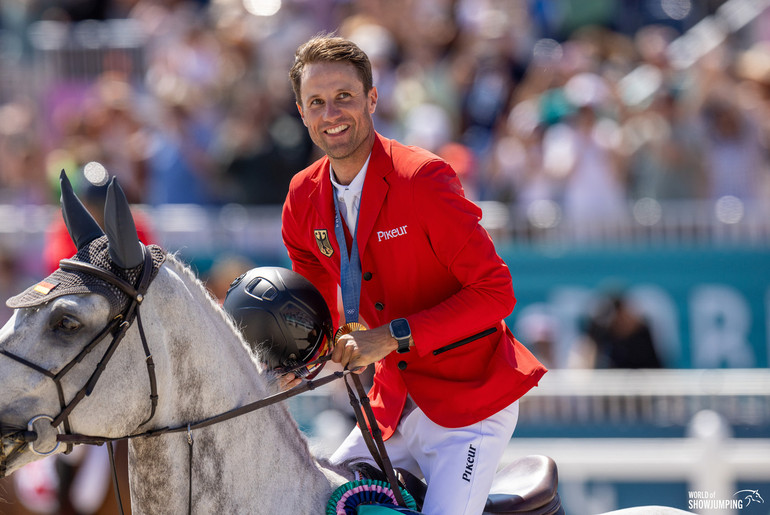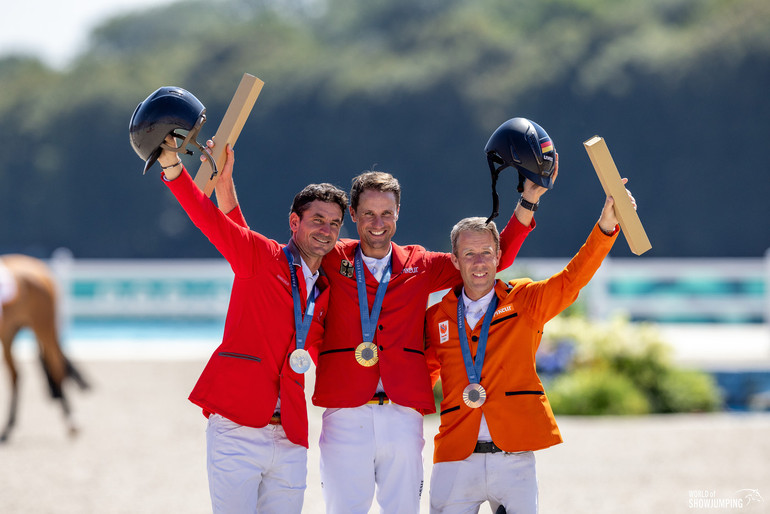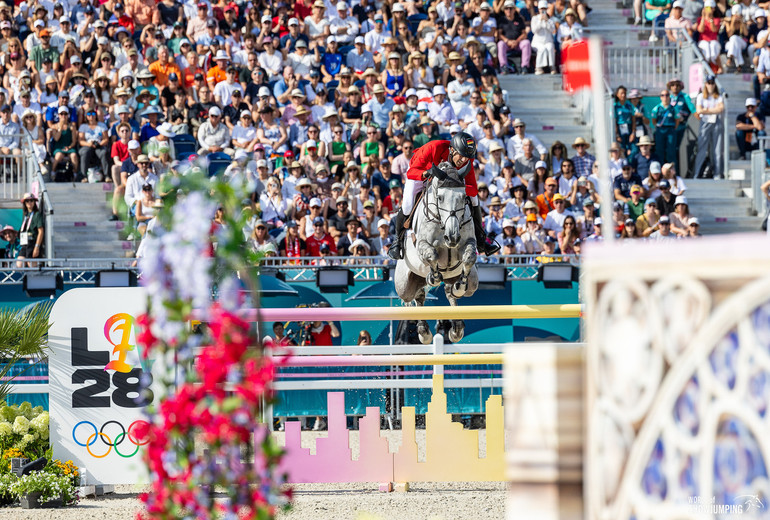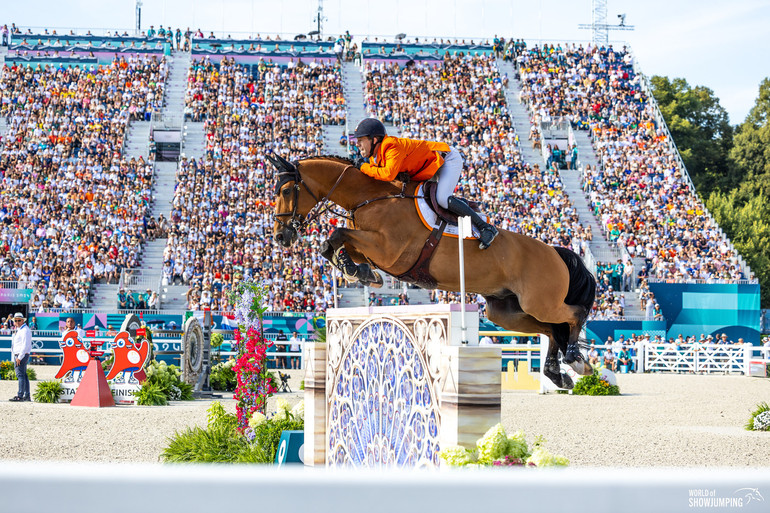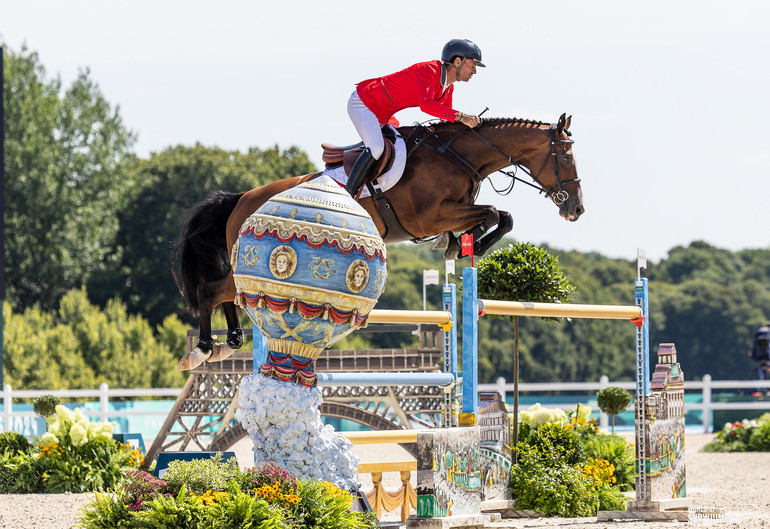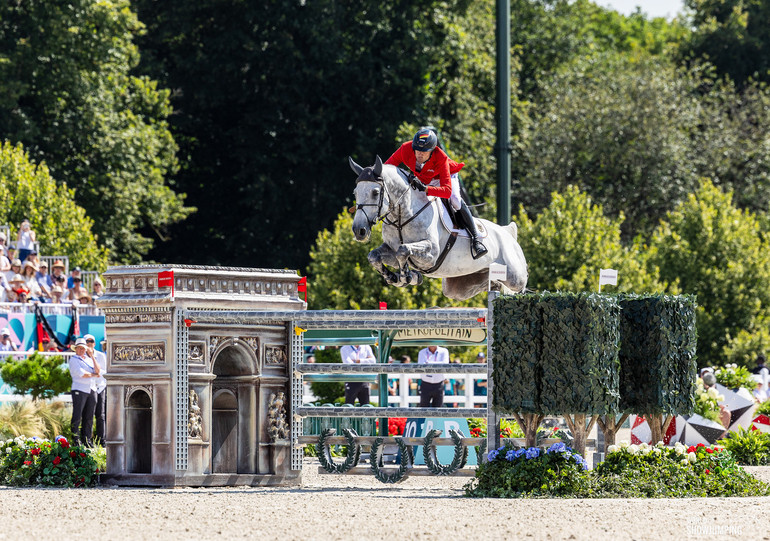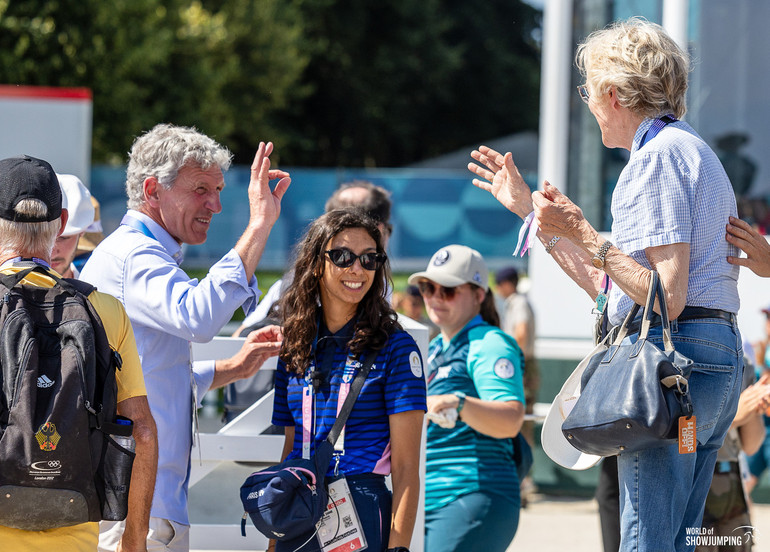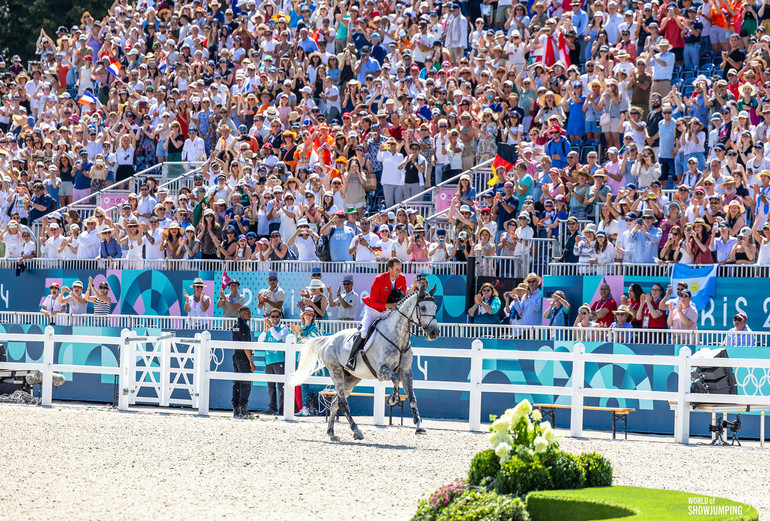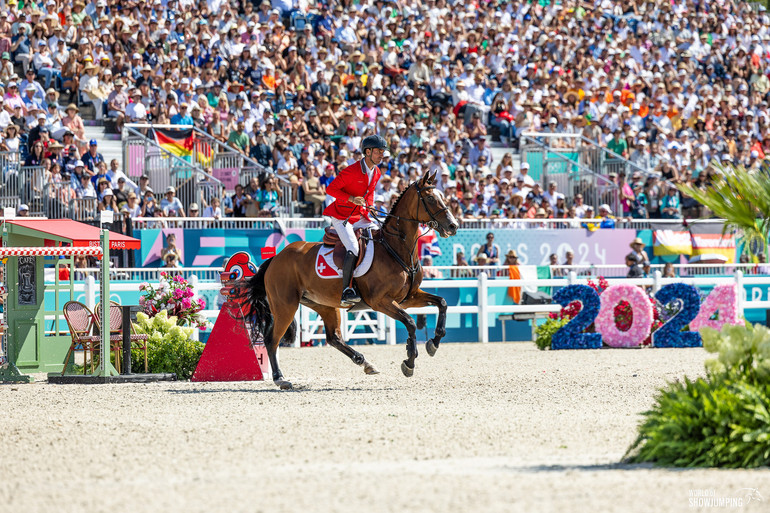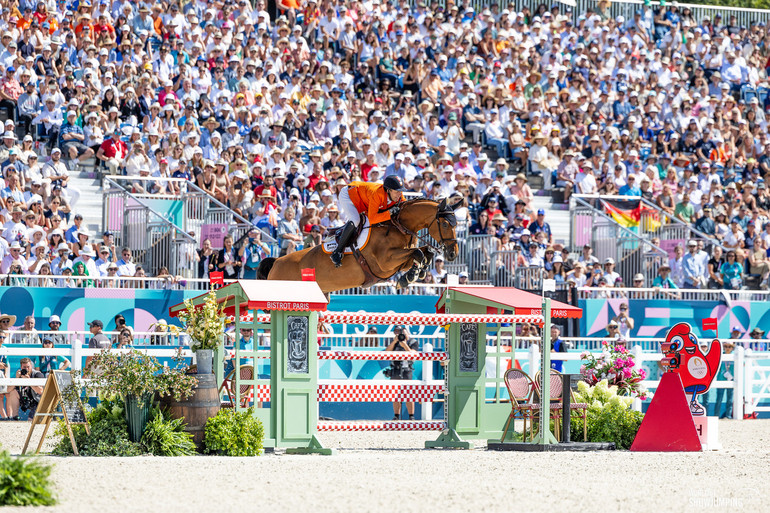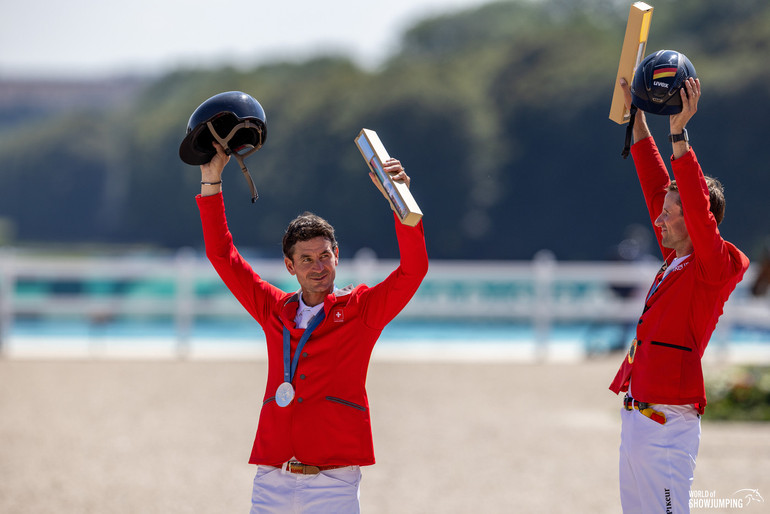Text © World of Showjumping
With the breath-taking Château de Versailles as the backdrop, Germany’s Christian Kukuk and Checker 47 (Comme Il Faut x Come On) were crowned Olympic champions in Versailles. As the only horse-and-rider combination with a double clear round in the final, Kukuk and the 14-year-old gelding won the gold, followed by Switzerland’s Steve Guerdat and Dynamix de Belheme (Snaike de Blondel x Cornet Obolensky) – reigning European champions – who claimed silver, and Netherlands' Maikel van der Vleuten and Beauville Z (Bustique x Jumpy des Fontaines) who repeated their bronze from Tokyo in 2021.
The Olympic individual final had it all, and with only three clear rounds, course designers Santiago Varela (ESP) and Gregory Bodo (FRA) could not have gotten it more right. It was a long and tough course that waited for the thirty horse-and-rider combinations that had qualified, and as they started over on a score of zero, it was all to play for as the individual medals were to be decided in Versailles.
Fifteen fences, nineteen efforts – all stunningly designed for this once-in-a-lifetime occasion of Paris 2024 – were waiting for the riders, and as during the entire week of competition in Versailles, it was full of options. Today, it was the second element of the La rue Française-combination at 5ab that caused the most heartbreak, with a distance of 8.10m from the 1.58m upright coming in, to the oxer out – which was measuring 1.55m both in front and in the back, with a width of 1.60m.
For world no. one Henrik von Eckermann and King Edward (Edward x Feo), who came into the competition as one of the favourites for the medals, it was the line from the open water to the Tour Eiffel at no. 7 and Arc Triomphe at no. 8 that would turn into a nightmare that ended all dreams of a podium. Adding on the line to no. 7, the Swedish multi-medallist had to push to reach his next distance, and after the landing where the two should have turned right towards the wall at no. 9, they instead parted ways. Luckily, King Edward stayed calm in all the turmoil to quickly get a head-collar on with his rider leading him out on foot. It was certainly not the ending von Eckermann had visualized coming into the final.
Switzerland’s Martin Fuchs and Leone Jei (Baltic VDL x Corland) also had a dramatic twist to their round. The Swiss rider lost one of his stirrups in the landing coming down from 5b, and could not retain it – jumping the rest of the course without. Miraculously, he managed to stay clear with only one stirrup all the way until the last LA 2028-oxer, where the back rail undeservedly punished him by falling to the ground. USA’s Laura Kraut and Baloutinue (Balou du Rouet x Landor S), as well as Austria’s Max Kühner and Elektric Blue P (Eldorado vd Zeshoek x For Pleasure), also fell victim to the last oxer, being clear all the way until this final fence on the course – keeping them out of the jump-off.
It was not to be for Great Britain’s Ben Maher either, who came to Versailles as defending champion following his individual title in Tokyo. Like so many, Dallas Vegas Batilly (Cap Kennedy 2 x L'Arc de Triomphe) hit the back rail on the oxer at 5b – keeping them out of the jump-off. However, leaving Versailles with the team gold, Maher has added another medal to his outstanding collection.
The first to solve all the questions asked by masterminds Varela and Bodo was Kukuk, who made it all look deceptively easy as no. 7 to go in Versailles. One rider later, Maikel van der Vleuten and Beauville Z secured a jump-off with Maikel’s father, and biggest supporter, Eric proudly watching on the Kiss & Cry.
It would take another fourteen horse-and-rider combinations before the third clear came, courtesy of Steve Guerdat and Dynamix de Belheme. It’s been a long week in Versailles for the Swiss rider – 2012 Olympic champion – as he missed out on the team final after a disappointing start to the Games. However, as the sportsman he is, Guerdat returned with a bang in the individual qualifier – leaving the disappointment behind him to post a clear round that qualified him for the final.
Hopes were high for home hero Julien Epaillard who was last to go with Dubai du Cedre (Baloubet du Rouet x Diamant de Semilly) after topping the individual qualifier. But, the deck of cards at 12b was not in their favour, and through a loud gasp of disbelief from the crowds a rail fell to the ground. It would be a jump-off of three for the medals, with no French rider in it.
The Olympic format differs from the European and world championships as no faults are carried through, and it definitely benefited Kukuk and van der Vleuten today who both had qualified for the final on a score of four penalties, unlike Guerdat who had been clear. But, similar to much else in Versailles, those rounds were all history today when the medals were to be decided between the three.
Coming in as first to go in the jump-off, Kukuk took all the risk with a super tight turn on a great angle to the fourth fence on the new and shortened course – the Tour Eiffel-jump – before rolling back to the b- and c-element of the former triple combination – the Métropolitain – then turning on a dime back to the deck of cards at 12b, before racing down to the last oxer, the Arc Triomphe. The clock had stopped at 38.34 with the German supporters going wild; it looked like Kukuk would be tough to beat.
Next in, van der Vleuten had the chance to better his bronze from Tokyo, but a rail on the oxer at 10b hit the ground, to leave him on four faults and a time of 39.12 seconds.
It all came down to Steve Guerdat and Dynamix de Belheme who entered the stadium in Versailles to loud roars from the crowds – the Swiss rider is truly the darling of showjumping fans world-wide. And despite coming very deep on the second fence of the course – the Bistro-oxer – which forced him to add a stride on the line to the next jump, it was looking good for Guerdat as he turned tight to the penultimate upright. However, he had to pay for the risk in the currency of a pole down to add four penalties to his score – just 0.04 seconds behind Kukuk as he crossed the finish line.
“Honestly, there was not so much in my head,” Kukuk said about going first into the jump-off. “We only had three clear rounds, so I knew I had a medal, so I felt zero pressure going in the ring. It did not matter what would happen, I would have a medal and that was already a huge thing. But, I knew what my horse is able to do, I knew what I am able to do, he won two Grand Prix classes already this year, so we are very competitive. I tried to find the balance to not over-try it, and not take the last risk, but still be that quick that I knew the other two would have to take some risk here and there. Then it can happen; you can have one down, and it happened to both of them – they had to try, and they had one down, so I was the only double clear and that makes me really proud.”
“It’s the most emotional day in my life honestly, in my career – this is the highest you can achieve in our sport. I am one of only a few ones calling myself Olympic champion, Olympic gold medallist, and this is something that will stay forever,” Kukuk said. “I have to realize that still in the next days, there is also probably a lot coming up for me, but in this moment I am just really, really proud and happy for my horse, my family, my staff, my groom – my whole team around. That all of them actually are here, that I can share this moment with them, is also something very special.”
“I am really happy for my horse, he really deserved this medal,” Kukuk said of Checker – his partner of the last four years. “The last year I think he has been the most outstanding horse, and I am just happy that we really made it today. His personality is actually quite funny; he is very self-confident, but in the next moment, he can be really spooky and shy about funny things – but not in the ring, in the ring he is like a lion. He is always fighting for me, he always tries his heart out for me and that makes him special – but these are special horses, they are really, really smart in their heads. He understands it is a special situation, and that’s why he is so good.”
“From the first moment, I had a special feeling on him – I had the feeling he can do something special,” Kukuk said about his first meeting with Checker. “It took a while with him actually, we had good results, but in the last year what he has been doing… Our partnership, knowing each other so well, created something special.”
While Guerdat had just missed out on another Olympic gold medal, he was still smiling big. “I am going to enjoy it,” Guerdat said about the silver medal. “I had a few regrets after London; that I felt that I did not enjoy it enough, running from show to show, head down – when I look back, I think these medals are so difficult to have so you have to try and enjoy it if you get the chance to get another one. Now, I got the luck to have another one, I have an amazing family, my wife and my daughter, so I am definitely going to spend a bit more time with them in the coming months.”
“We were probably lacking one big show before we came here. She jumped her last big class in La Baule, then she only had a few small classes in between so the first day was pretty tough,” Guerdat said about the team qualifier, that did not go according to plan. “We were just really not into it, so we had a very bad round – not because of the result, but because of the way the round went. It made me really upset, or really sad, that I had to show my mare like that. But fortunately, we were able to come back, and I was able to live up to her and show everybody how great she is.”
“My mare was spectacular today,” Guerdat said. “Of course, I am very upset about my jump-off, but this is not what I want to focus on – I want to be happy about my second medal – and that colour is nice as well.”
“The jump-offs are still our weakness with Dynamix, I have known this for over a year,” Guerdat said. “I have been trying to train that as much as possible, but you don’t get so many tries – right? Today, I was confident because it was doable, the time was not absolutely crazy, already from 1-2 I had a good turn, but then she overjumped number 2 so I had to add a stride to number 3 so then I lost time. Then I thought that something has to happen, and then you lose a bit the focus on the horse and just think about the time, so it was a mess, it was definitely not good enough, but I don’t mind. Right now I just want to enjoy the medal that I have won, not the medal that I have lost.”
“All his life, he has been extremely consistent,” van der Vleuten said of Beauville after claiming their second individual Olympic bronze medal. “He is a horse that is extremely careful, but at the same time he always fights for me, and he is brave. When I go into the arena, I know he will give everything for me. But of course, this takes time – a lot of hours, days, years, of practicing. We took a lot of time in the beginning when he was seven and eight to get the confidence in each other. Then I was understanding my horse in and out, and the other way as well. Once I had the feeling the horse believed in me, I think we grew into a great partnership and that brought us already to fantastic memories.”
The medallists all agreed that the iconic Olympic venue in Versailles has been truly special to compete at. “Everything has been absolutely perfect here for the horses. Also the sport in general, the public was unbelievable,” Guerdat – who had just completed his 6th Olympics – said. “France is definitely a horse country, and I think it was great for our whole sport to be able to show what has been shown these last ten days with the eventing, dressage and today with the showjumping. It was everything that our sport could have dreamed of to stay a full part of the Olympic Games.”
6.8.2024 No reproduction of any of the content in this article will be accepted without a written permission, all rights reserved © World of Showjumping.com. If copyright violations occur, a penalty fee will apply.



